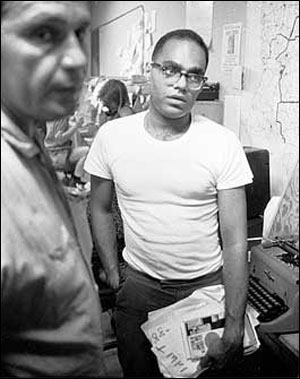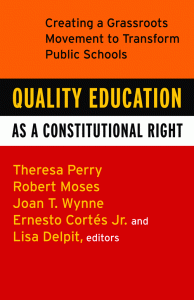Dr. Robert P. Moses, who played a key role in the drive for voting rights in the 1960s and who has been a leading voice for culturally responsive mathematics education since the 1980s, will spend the day at TCNJ Feb. 2, 2012. He will address the campus community at 4 pm in the Mayo Concert Hall of the Music Building. The event is free and open to the public.
As the former leader of the Student Nonviolent Coordinating Committee’s (SNCC) Mississippi Project in the 1960s, an architect of the Mississippi Freedom Democratic Party, the recipient of the prestigious MacArthur Fellowship, and a Harvard Philosophy PhD, Dr. Moses has a wealth of experience in civil and human rights. Since the 1980s, Dr. Moses has converted those experiences into a program of innovative approaches to education for underserved and distressed communities in the United States and abroad. Dr. Moses’s efforts resulted in the creation of the Algebra Project in 1982, an initiative designed to create “sustainable, student centered models” for school reform that builds “coalitions of stakeholders within local communities, particularly underserved” populations. (Algebra Project history)
The Algebra Project, which emphasizes math skills and pedagogy, has gained national recognition as a community-based,

bottom-up approach that is innovative and sensitive to vagaries of state and local budgets. Dr. Moses has captured many of the ideas for the Algebra Project in his acclaimed 2001 co-authored book, Radical Equations: Civil Rights from Mississippi to the Algebra Project that Princeton Professor, Dr. Cornel West, described as “the definitive book on one of the most important projects of youth empowerment and citizenship of our time.” His articles on improving mathematics education have appeared in such influential journals as Social Policy, Phi Delta Kappan, and the Journal of Mathematical Behavior.
Dr. Moses’s presentation will invite the TCNJ community, local citizens, and state leaders to discuss the prevailing challenges to education and consider creative solutions that draw upon our strengths.
“Today, I want to argue, the most urgent issue affecting poor people and people of color is economic access. In today’s world, economic access and full citizenship depend crucially on math and science literacy. I believe the absence of math literacy in urban and rural communities throughout this country is an issue as urgent as the lack of registered Black voters in Mississippi in 1961”
Robert P. Moses, Radical Equations: civil rights from Mississippi to the Algebra Project, Beacon Press, 2001
Sponsors: Department of African American Studies, Black Student Union, School of Humanities and Social Sciences, School of Science, School of Education, Department of Mathematics, Department of Women and Gender Studies, Allen Dawley Center for the Study of Social Justice, Committee for Cultural and Intellectual Community. Supported by Student Activities Funds.
Selected Learning Resources for Dr. Moses, Freedom Summer and the Algebra Project
Books
(Note: Dr. Moses’ books will be on sale in the TCNJ bookstore. He will sign books at the end of his presentation.
 Robert P. Moses and Charles Cobbb. Radical Equations: Civil Rights from Mississippi to the Algebra Project. Beacon Press, 2001
Robert P. Moses and Charles Cobbb. Radical Equations: Civil Rights from Mississippi to the Algebra Project. Beacon Press, 2001 Theresa Perry, Robert P. Moses, Ernesto Cortesis, Lisa Delpitis, Joan T. Wynne, eds. Quality Education as a Constitutional Right: Creating a Grass-Roots Movement to Transform Public Schools. Beacon Press, 2010
Theresa Perry, Robert P. Moses, Ernesto Cortesis, Lisa Delpitis, Joan T. Wynne, eds. Quality Education as a Constitutional Right: Creating a Grass-Roots Movement to Transform Public Schools. Beacon Press, 2010
Websites
-
- The Algebra Project
- The Robert Moses Archive
- Images of Hate and Hope: Historic Images from Freedom Summer in Newseum’s Collection
- Robert P. Moses speech on Freedom Summerat Stanford University, April 23, 1964
- Civil Rights Movement Veterans Website
Videos
Visionary Project interview, Freedom Summer, Part One
Part Two:
The Algebra Project:
Th:
How the Algebra Project works
:
Baltimore Algebra Project march for Jobs and Education:

